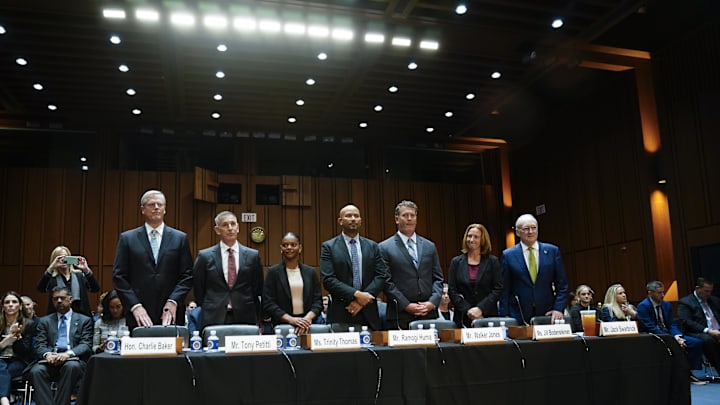SEC athletes might experience $2.8 billion settlement fallout unlike their peers, expert says

How will the landmark NCAA antitrust settlement reshape the economics of college sports?
Len Perna has an educated guess. The founder, CEO and chairman of executive search firm TurnkeyZRG suggested in a new interview with Puck's John Ourand that the professionalization of college sports will not affect each NCAA member conference equally.
MORE: Big Ten coach received $3.4 million loan, but records show he hasn't paid it back
The $2.8 billion, 10-year settlement will pay past players for missed name, image and likeness opportunities and allow colleges to pay current players directly starting July 1. The financial windfall effectively turns college athletes into professionals overnight, with schools from the four power conferences holding most of the purse.
That doesn't mean athletes competing in the ACC, Big Ten, Big 12, and SEC will see equal rules governing their pay. Quite the opposite, in fact, Perna said on the most recent episode of "The Varsity."
Schools in the Northeast, Midwest, and the Western U.S., Perna said, are more likely to land on collective bargaining as a means for devising rules that govern "the transfer of talent, the transfer portal, a salary floor, a salary cap — all of the things that creative competitive balance" in professional sports leagues.
As for the southern schools?
"I think the big wedge issue that you're going to see in college football in particular ... is collective bargaining," Perna said. "The schools in the SEC and for the most part the schools in the South have a lot of politics wrapped around bargaining with a union of student-athletes. There's just a lot of history around right-to-work states, and the boards of those schools in the SEC."
The so-called "right-to-work" states have laws that prohibit union security agreements between employers and labor unions. The University of Missouri doesn't play in a "right to work" state, while the other SEC schools do. The other power conferences include a more balanced mix.
"This isn't a Greg Sankey issue," Perna said, referring to the SEC commissioner. "This is the people even above the university presidents that are on the boards of these schools, that tend to be alums and donors of those schools — they all live in a world where they don't want to have to sit across from a union of student-athletes and bargain with them (in right-to-work states). They don't want to get demands from student-athletes. So I don't think the SEC will ever really be comfortable with collective bargaining with college football players."
Parna thinks the schools whose athletes engage in collective bargaining will be able to budget, plan, and pay for their costs in advance, while SEC schools will "be in a perpetual free agent marketplace being driven by college football agents, and they'll be driving up the cost every year."
On first listen, that sounds a lot like the current state of affairs in the NCAA.
GET MORE TOP STORIES from The Big Lead by subscribing to TBL YouTube channel
U.S. OPEN: 2025 U.S. Open tee times: Round 1 groupings for Thursday
NFL: Kansas City Chiefs could leave Arrowhead Stadium as awkward stadium decision looms
MLB: When will Shohei Ohtani return to pitching rotation? Dodgers star gets projected timeline
WNBA: WNBA ratings reportedly nosedive over 50 percent in Caitlin Clark’s absence
VIRAL: Former NBA star DeMarcus Cousins suspended for season after groin-scratching altercation with fan